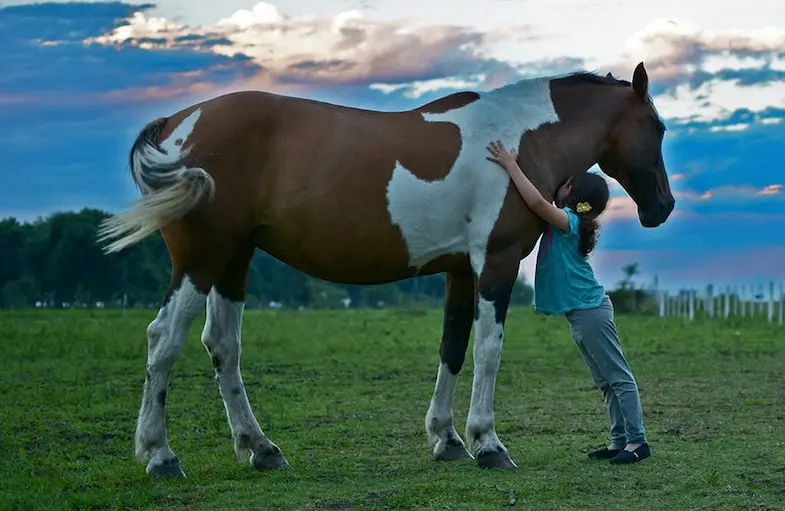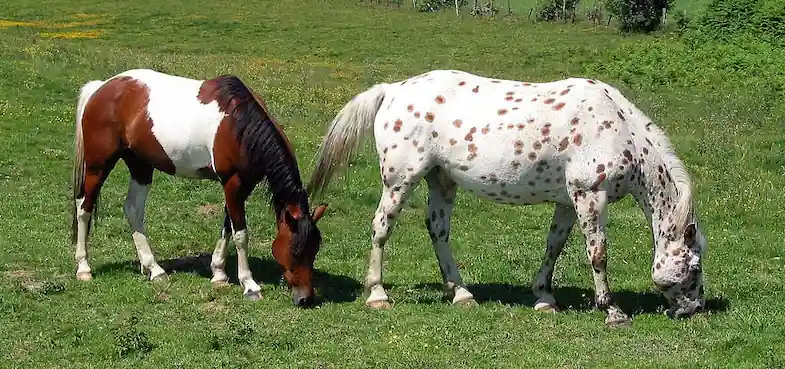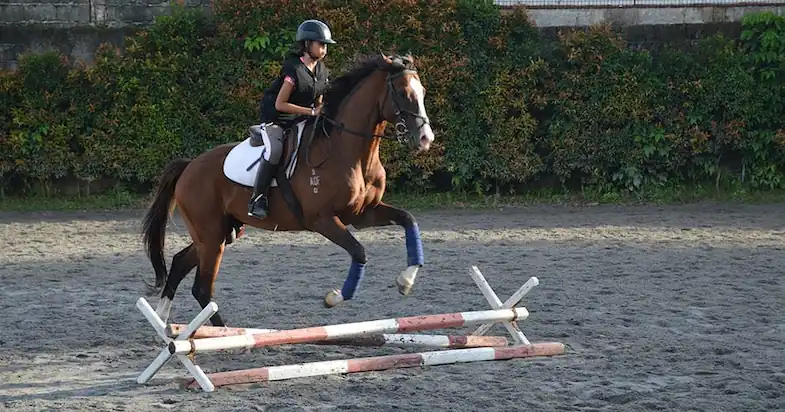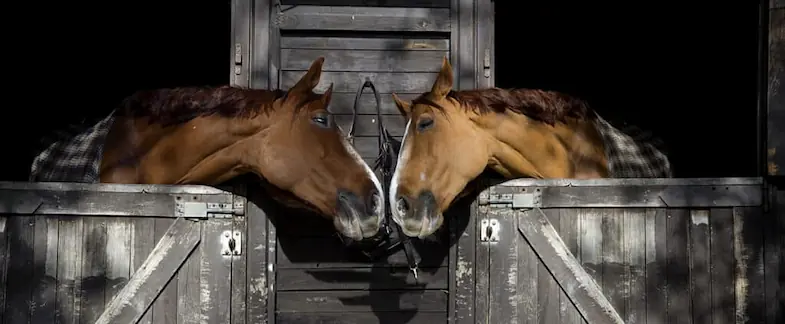Buying your first horse is an exciting time, after all, you’re about to start a great friendship that will hopefully last for many years to come, but what many people don’t mention is that it can also be a daunting process, especially if you don’t have a huge amount of experience with horses. Buying a horse is a big commitment, both in time and money and you’re understandably worried about it. It’s easy for people to say don’t worry but in reality, you’re still going to worry which is why I thought I’d put these tips together – to help you decide what sort of horse will best suit you, not only now but also in the future.
Choosing the right size of horse for you
You might think that if you’re a certain height or weight then you need a particular size of horse but this isn’t quite true, while there are limits on the amount of weight any horse can carry, when it comes to height there aren’t any hard and fast rules.
As a general rule of thumb, a healthy adult horse can carry around 15% of their body weight but no more than 20% although this should be reduced for younger horses as well as those that are heading towards retirement. You’ll also need to take the weight of the tack into account too, and when it comes to Western saddles that could be as much as 60lbs (4.2 stone / 27kg) – although an English saddle can start around 10lbs (0.07 stone / 0.4kg). If you’re too heavy for a horse then you’ll cause the horse a great deal of physical stress and, over time, serious injury.
When choosing the right horse your weight is far more important than your height but it does still play a role, although your proportions are more important than your overall height. Your legs, when in the stirrups, shouldn’t extend too much beneath the horse’s belly. One of the best ways of determining if a horse is right for your height is to sit on it! I know that might sound silly to say but you’ll be able to feel if you are a good match in that respect.
If you want to know more about what size horse you should be riding then check this article out.
Finding the best breed for you
Not everybody wants to have a purebred horse but if you like the thought of having a registered horse whose pedigree you can be sure of then you need to think about what breed is best for you. According to Wikipedia, there are over 440 different horse and pony breeds in the world today, each with their own set of ‘special skills’. This number of breeds can make it very difficult to narrow it down to just one breed which is why it’s better to start by thinking about a particular group of breeds based on your tastes, what you enjoy doing, or your requirements. For example, if you’re interested in jumping then warmblood breeds, such as the Selle Français or Trakehner would be far better than a heavy horse breed such as the Shire Horse or Percheron. Likewise, if you enjoy trail riding, then a fiery breed such as an Arabian may not be the best, especially when compared to breeds such as the Appaloosa or Quarter Horse.
If you are interested in a particular discipline then you might find some of my recent articles on the best breeds for various activities helpful:
If, however, you’re not looking to specialize in any particular discipline but still want to have a purebred horse then you might find some of these articles here helpful.
Choose a horse that matches your personality
Most people don’t even consider personality when they’re looking for a horse but it can make more of a difference than you might think, especially if your personality clashes with that of your new horse. After all, if you’re a quiet, nervous person then a highly-strung stallion isn’t going to suit you very well, but on the other hand, if you’re an excitable, energetic person then it wouldn’t be fair to have a shy, timid horse.
It’s not always easy to tell what a horse’s personality is going to be like when you’ve only seen the horse a few times which is why you should always speak to the owner about the horse’s personality. If you can you should also speak to other people around the yard and the horse’s veterinarian, they may not be able to give you an extensive run down but can certainly let you know if there’s anything you should be aware of. Making at least one unannounced visit can help too because it’ll give you a chance to see the horse as it is without it being ‘prepared’ for your visit.
Some owners will allow you to have a trial of the horse before you commit to buying so if you can, you should make full use of this, it would give you a better understanding of how the two of you could/would work together.
Consider your level of experience when choosing a horse
A common mistake that many new riders make is they think that if they buy a young, recently trained horse or a horse that hasn’t yet been trained they can learn together but, while this may sound like a good idea it’s fraught with problems. Yes, you’ll learn together but sadly you’ll quite likely both end up learning bad habits because neither of you will be experienced enough to steer the other one in the right direction.
If you are an inexperienced rider it can be difficult to admit it to other people (especially those that are experienced) but you shouldn’t be embarrassed, don’t forget that even the world’s best riders were once at the level you are at the moment.
Take your future goals into account when buying a horse
Just because you’re a new rider at the moment it doesn’t mean to say that you don’t have goals and ambitions for the future, things that you want to do, whether it’s competing in a certain discipline, showing your horse, or just riding for pleasure. This is why it’s important to consider where you are at the moment as well as where you’d like to be in the future.
Most horses are capable of turning their hooves to anything, within reason, but if you are looking to specialize in a discipline then it’s better to look for horses that have at least had some basic training in that particular area. If, however, you only want to ride for pleasure and are after a ‘go anywhere, do anything’ horse then one that’s described as a good all-rounder or as experienced would be ideal.
Should you lease or own a horse?
Owning a horse isn’t for everybody, some people don’t like the commitment of having their own horse while others prefer the flexibility that leasing offers. Whatever your reasons, leasing can be a great alternative to owning especially if you’re a new owner, as an added bonus it’s often cheaper too and some owners will give you first refusal if they decide to sell the horse.
If you want to know more about whether leasing or owning is best for you, you should read this article.
What should you do next?
Now that you’ve decided what type of horse is best for you and your needs it’s time to start looking for that perfect horse. I know that you’re eager to find your first horse but this is something that shouldn’t be rushed, it can be very traumatic and expensive if you do. If you find a horse that ticks every box don’t buy it straight away, if you’re worried that somebody else will then speak to the owner and ask if you can reserve the horse. If they agree to this then you’ll probably have to pay a deposit but it’ll give you time to have all of the pre-purchase checks done.
Buying a horse can be a long process with lots of steps that, while not being compulsory, are essential which is why I didn’t want to skip over it quickly. Instead, I thought it was better to direct you to an in-depth step by step guide to buying a horse I wrote recently.
Further reading
- Where should you keep your horse?
- How much space do horses need?
- Keeping a horse on its own
- Beginner’s guide to horse care
- What should your horse be eating?
- Feeding a horse with no pasture
- Dos and don’ts of feeding treats
- Prevent your horse from being stolen
- Essential life hacks for horse owners
- 300 of the best ever horse names
I hope you found this article helpful. If you did I’d be grateful if you could share it please as it would really help me.
Recommended products
Over the years I have tried hundreds of different horsey products, from various blankets and halters to different treats. Some I’ve loved, others I’ve hated but I thought I’d share with you my top all-time favorite products, the ones I never leave the yard without. I’ve included links to the products (which are in no particular order) that I really think are great.
- Horse Knots by Reference Ready – If you’re like me and enjoy pocket reference guides then you’ll love this knot tying guide. These handy cards can easily fit in your pocket or attach to the saddle for quick reference. They’re waterproof, durable and are color coded to make them easy to follow.
- Mane ’n Tail Detangler – Even if you never show your horse you’ll need to detangle his tail from time to time (and possibly his mane too) which is always a challenging chore! I’ve found that if I run a little bit of detangler through my horse’s tails every few days it stops them from getting matted up and makes combing them easy, even if they’re coated in mud. I don’t know if I should admit to this or not but it also works wonders on my hair.
- TAKEKIT Pro clippers – Over the years I’ve tried a lot of different clippers and while some were obviously better than others I found these to be by far the best. They are heavier than a lot of other clippers but for me, that’s a good thing, it makes them feel more sturdy and hardwearing. On top of that they have a range of speeds so are just as good for clipping your horse’s back as they are his face. I also like the fact that they come in a handy carry case but that’s not for everybody. The company that makes them is super good and incredibly helpful too, a real bonus these days. The only thing I wasn’t keen on was the fact that it doesn’t come with any oil, but that’s not a major problem as it’s not difficult to buy lubricant.
- Shire’s ball feeder – There are so many boredom buster toys out there but I like to use these every day, regardless of whether or not my horses are bored. I find that it helps to encourage my horses to problem solve by rewarding them with treats (or pieces of fruit) but it also mimics their natural grazing behavior which helps to keep them calm and de-stressed.
- Horse safe mirror – This is a strange one that many people are surprised about but I like to put horse safe mirrors in the trailers as well as in the quarantine stalls. It helps to prevent the feeling of isolation by giving the impression of other horses being around. Being herd animals horses can get extremely stressed when they feel that they’re on their own but with these stick-on mirrors, they believe that at least one other horse is with them.
- Rectal thermometer – I know this isn’t glamourous at all but it’s vital for your horse’s well-being to be able to check their temperature and a rectal thermometer is the easiest way of doing this which is why I’ve added it to the list.
Shopping lists
I’ve also put together a few shopping lists of essential items that I’ve found helpful over the years. I’ve broken the lists down into different categories rather than put everything in one massive list 😉





